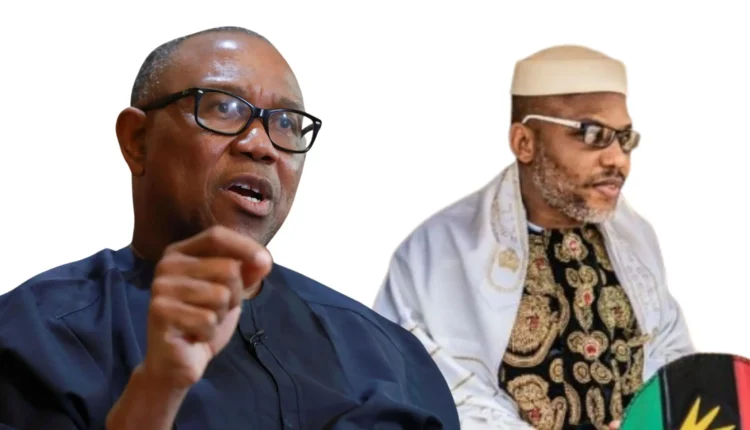Obi slams Tinubu Govt over Kanu conviction, says decision ‘inflames tension, distracts from insecurity
Maureen Aguta
Former Labour Party presidential candidate, Peter Obi, has criticised the conviction of Indigenous People of Biafra (IPOB) leader, Mazi Nnamdi Kanu, warning that the development risks inflaming tensions in a country already overwhelmed by insecurity and economic distress.
In a Saturday statement, Obi said the ruling should compel “every well-meaning Nigerian to pause and reflect” on the nation’s worsening fragility. Rather than easing discontent, he argued, the government’s approach “may well only aggravate it.”
Obi, a former governor of Anambra State, has long maintained that Kanu’s arrest and prolonged detention were unnecessary and counterproductive. The latest conviction, he said, reflects “a failure of leadership and a misunderstanding of the issues at stake.”
“For years, I have consistently argued that dialogue, constructive engagement, and inclusive governance offer the path to lasting peace,” he said. “Coercion becomes necessary only when reason has been exhausted. In this case, reason was not only not exhausted, but was probably not explored at all.”
Obi noted that the grievances championed by Kanu were longstanding and not beyond resolution. He insisted that responsible leadership should respond to such concerns through dialogue and reforms aimed at strengthening national unity—not actions that widen distrust.
He condemned what he described as the Federal Government’s “avoidable distraction” from the more urgent challenge of nationwide insecurity. “Citizens are already overwhelmed by harsh economic realities and rising threats to safety. Leadership should de-escalate, not inflame,” he said.
Obi acknowledged arguments that “the law has taken its course,” but countered that governance often requires more than a rigid application of legal doctrine. Nations around the world, he noted, routinely adopt political solutions, negotiated settlements, or amnesty programmes when legal measures fail to address broader national interests.
“The handling of Kanu’s case mirrors a situation where a man trapped in a hole keeps digging instead of finding a way out,” he said.
He appealed to the Presidency, the Council of State and respected national figures to intervene, saying Nigeria must prioritise cohesion and long-term peace. “If we truly desire a new Nigeria—one that is united, peaceful, and progressive—our leaders must choose healing over hostility, reconciliation over retaliation, and dialogue over division.”
Despite the tension generated by the judgment, Obi urged Nigerians to remain hopeful. “My ultimate call at this time, without prejudice to how anyone feels about the court’s decision, is for us to remain optimistic. Peace and reconciliation will come in the end,” he said.


